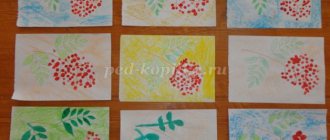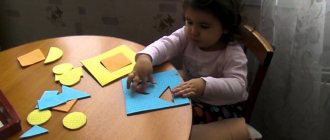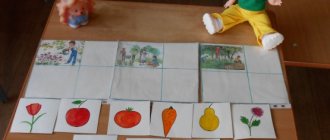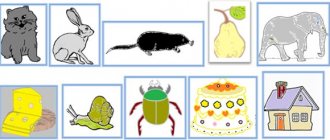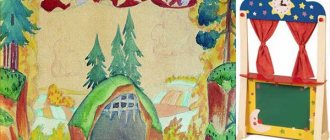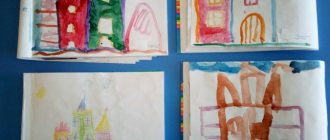Preparatory group. Senior preschool age. Children 6-7 years old
Photo report on circle work in mathematics for January (preparatory group)
Every year the number of circles increases , but despite their diversity , they are similar to each other in terms of the tasks they implement and methods of organization. Properly organized club in kindergarten will allow children to master useful skills and develop their potential...
Master class on the application “Christmas tree from paper circles” for children of senior preschool age
Objectives: - expand ideas about winter, the New Year holiday, the Christmas tree as a symbol of celebrating the New Year; — improve technical skills and skills in working with paper ; - strengthen the skills of folding paper and using scissors correctly; - develop creative...
Club work program in the preparatory group “Soon to school”
Author-compiler:
Zakharova Tatyana Vladimirovna,
teacher of MAUDO "Kindergarten No. 10"
Yalutorovsk
Explanatory note
The performance of a primary school student and the quality of his knowledge acquisition during the school period largely depends on preschool preparation. Why does one child do well in elementary school while another faces serious problems? The point is not only in the presence or absence of abilities, but also in what development the abilities received in the first six to seven years of the child’s life. Unfortunately, most modern children prefer a computer or TV to copywriting or some serious games. To help children prepare for school life, I have developed a group work program called “Soon to School.” The program includes:
1. Games and tasks for speech development.
2.Development of mathematical abilities.
3. Exercises to develop fine motor skills of the fingers.
4. Games for the development of logical thinking, memory, attention.
5. Material on familiarization with the surrounding world.
This program is designed for children 6-7 years old; circle activities are designed to be carried out once a week for 30 minutes. To determine the level of mastery of the program, diagnostics will be carried out.
Target :
To comprehensively prepare children for school, give them all the necessary knowledge, and help them cope with the club work program.
Tasks:
1. Develop children’s ability to listen carefully and complete tasks, answer questions with complete answers.
2. To develop logical and figurative thinking, speech, attention, and memory in children.
3. Promote children's high intellectual ability. 4. To instill accuracy in children when performing tasks,
Long-term plan for group work “Soon to school”
| № | date | Tasks | Techniques | Note |
| 1. | To develop the ability to distinguish between vegetables and fruits. | Exercise “Draw arrows”, “Arrange vegetables and fruits” | ||
| 2. | Introduce children to sounds, develop the ability to distinguish between vowels and consonants. | Exercise “Name the sound.” D/game “Pick up a picture.” | ||
| 3. | Continue to teach counting within 10, help remember numbers. | Exercises: “Complete the task according to the example”, “Write in the missing number”. | ||
| 4. | To develop the ability to shade images, develop small motor skills | Exercises: “Draw a line” “Shading according to the sample.” | ||
| 5. | Teach children to solve logical problems, develop thinking, speech, attention. | Exercises: “We develop living and inanimate nature,” “Name the object.” | ||
| 6. | Continue to develop knowledge about the world around us. | Verbal game “Name the object of the past and present”, exercise “Connect the objects”. | ||
| 7. | Continue to teach children to distinguish vowels and consonants, find objects with a given sound, write the letters a, o. | D/ game “Come up with a word”, task “Color objects with a given sound”, “Write the letter.” | ||
| 8. | Develop the ability to compare objects and solve simple problems. | Exercises: “Arrange the signs”, “Solve examples”. | ||
| 9. | Introduce children to graphic dictation and develop the ability to navigate on a sheet of paper. | Tasks: “Draw a picture”, “Graphic dictation”. | ||
| 10. | Continue teaching children to solve logical problems and perform attention tasks. | Tasks: “Solve the problem”, “Draw an object”. | ||
| 11. | Develop the ability to remember short sentences and perform simple tasks. | Tasks: “Solve the problem”, “Complete the object”. | ||
| 12. | Continue teaching children to classify objects and perform attention tasks. | Verbal game “Distinguish the animal world”, exercise “Connect the animals and their young with arrows.” | ||
| 13. | Introduce children to deaf and voiced consonants and find them in words. | D/game “Pick up a picture”, task “Write letters”. | ||
| 14. | Repeat geometric shapes with children, continue to teach children to solve problems. | D/game “Name the figure”, exercises “Find a pair”, “Solve the problem”. | ||
| 15. | Teach children to find an extra object in a chain of words and perform attention tasks. | Exercises “What’s extra?”, “Connect with arrows.” | ||
| 16. | Continue to teach children to carefully shade objects. Finish drawing, perform graphic dictation. | Drawing a picture “Let’s complete the fairy tale”, graphic dictation. | ||
| 17. | To develop in children knowledge about surrounding objects - dishes, to classify objects according to their purpose. | Exercises “Find and circle”, “Place the dishes in their places”. | ||
| 18. | Teach children to form syllables from letters, divide words into syllables. | D/game “Name it correctly”, “Make a syllable”, “Read the syllables”. | ||
| 19. | Continue teaching children to solve examples, find neighbors of numbers, repeat the composition of a number. | Task “Complete the number chain”, “Find the number”, “Write down the neighbors”. | ||
| 20. | Teach children to draw figures of different sizes and stroke in one direction, write in cells. | Exercises “Drawing different shapes”, “Completing tasks”. | ||
| 21. | Teach children to complete tasks to develop logical thinking. | Exercise “Find the animal”, “Find the differences”. | ||
| 22. | Exercise children in reading small words and develop coherent speech. | Task “Read the word”, “Come up with a sentence”. | ||
| 23. | Strengthen the ability to navigate on a sheet of paper and perform creative tasks. | Exercises “Draw a line”, “Color the clown by numbers”. | ||
| 24. | Develop children's logical thinking and fine motor skills. | Task “Correct mistakes”, “Write letters”. | ||
| 25. | To develop children’s ability to compose a short story based on a picture and develop memory. | Compiling a coherent story based on a picture, exercise “Remember and name it.” | ||
| 26. | Develop children's ability to navigate on a sheet of paper. | Graphic dictation, exercise “Let's decorate the clearing.” | ||
| 27. | Exercise children in reading short words, highlighting a given sound in a word. | Exercise “Help Dunno read the word”, “Come up with a word”. | ||
| 28. | Exercise children in counting forward and backward. | D/game “Count correctly”, “Connect the numbers”. | ||
| 29. | Repeat the sequence of seasons with the children. | D/game “When does this happen?”, exercise “Similarities and differences”. | ||
| 30. | Reinforce the classification of objects and practice writing a descriptive story. | D/game “Make a flower”, exercise “Choose a word”. | ||
| 31. | Repeat geometric shapes with children, find objects in the environment that are similar to one or another shape. | Board game “Geometric Lotto”, exercise “Find the object”. | ||
| 32. | Exercise children in the ability to answer questions with different intonations. | Exercises “Answer questions”, “Question-answer”. | ||
| 33. | Exercise children in the ability to distinguish between days of the week and navigate on a sheet of paper. | Exercise “Arrange the numbers.” D/ball game “Name the day of the week.” | ||
| 34. | Exercise the ability to solve logical problems and develop children's memory. | Exercise “Solving problems”, “Remember and name”. | ||
| 35. | Develop fine motor skills and the ability to solve puzzles. | Task “Make a pattern”, exercise “Solving puzzles”. | ||
| 36. | Review the material covered with the children. | Entertainment “We want to know everything.” |
Literature:
O. Uzorova E. Nefedova. “1000 exercises to prepare for school.
O. Uzorova, E. Nefedova “300 patterns. Getting ready for school."
“The entire preschool program. Reading". S. E. Gavrina, N. Kutyavina, S. Shcherbinina “School for preschool children.” O.V. Dybin "I recognize the world."
Notebooks with tasks “Dividing words into syllables”, “Studying literacy”, “Studying mathematics”, “Testing the knowledge of preschoolers”.
Diagnostics of program mastery:
Low level: The child cannot independently complete tasks even according to the sample, and finds it difficult to answer the question posed even with the help of an adult.
Intermediate level: The child copes with all tasks with a little help from an adult, answers questions correctly, and needs a little help from an adult.
High level: The child copes with all tasks independently, speech is clear and intelligible. Can answer any question posed independently.
Attention! This program is the subject of proprietary rights and is protected by the Civil Code of the Russian Federation, the Law “On Copyright and Related Rights” and other legal acts on intellectual property.
The program can be used for familiarization and personal practical work in a preschool institution. Use of information is permitted provided that all copyright marks are preserved!
Ways and methods of protecting rights: If the work was used without the consent of the copyright holder (with the exception of special exceptions specifically provided for by the Civil Code of the Russian Federation, then the copyright holder can use all methods and methods provided by civil, administrative and criminal legislation to protect his exclusive rights).
We invite teachers of preschool education in the Tyumen region, Yamal-Nenets Autonomous Okrug and Khanty-Mansi Autonomous Okrug-Yugra to publish their teaching materials: - Pedagogical experience, original programs, teaching aids, presentations for classes, electronic games; — Personally developed notes and scenarios of educational activities, projects, master classes (including videos), forms of work with families and teachers.
Why is it profitable to publish with us?
1. “Kindergartens of the Tyumen Region” is an officially registered specialized media outlet at the federal level. 2. The activities of the editorial office are supported by the Department of Education and Science of the Tyumen Region 3. We issue a “Certificate of Publication” in the media. 4. The document has a unique number, is entered in the register, has the original seal of the editorial office of the online publication and signature. 5. “Certificate of publication” in the media is sent to the author in both paper and electronic versions.
Details >>>
Sample “Certificate of publication of author’s methodological material in the media.”pdf
Share
Physical education and sports clubs in preschool educational institutions - Program for the physical development of children 5–6 years old (2)
Publication “Program for the physical development of children 5–6 years old...” Lesson No. 23 1. Climbing the gymnastic wall in the same way, walking along the rail of the gymnastic wall with an added step, going down without missing the rails (2-3 times. 2 Jumping on two legs over the cord on the right and left, moving forward (distance 3 m) - 3-4 times. 3. Walking with...
Program for the physical development of children 5–6 years old (1) Requirements for the level of mastery of the work program By the end of the year, the child must know and be able to (the child must have developed the following knowledge and skills): Be able to maintain correct posture. Developed motor skills and abilities, the ability to creatively use them in independent...
Physical development program for children 5–6 years old Lesson No. 23 1. Climbing under the cord, without touching the floor with your hands, straight and sideways (several times in a row. 2. Balance - walking on a gymnastic bench sideways with an extended step, hands on the belt. 3. Jumping on two legs between 4-5 objects placed in a row (4-5 pieces, at a distance of 0.5 m...
A work program on physical development for pupils aged 4–7 years of a group with a general developmental focus. A WORK PROGRAM in the educational field “Physical Development” for pupils aged 4–7 years with a general developmental focus. The Federal State Educational Standard of preschool education determines the goals, objectives and content of the physical development of preschool children in preschool settings. They can...
